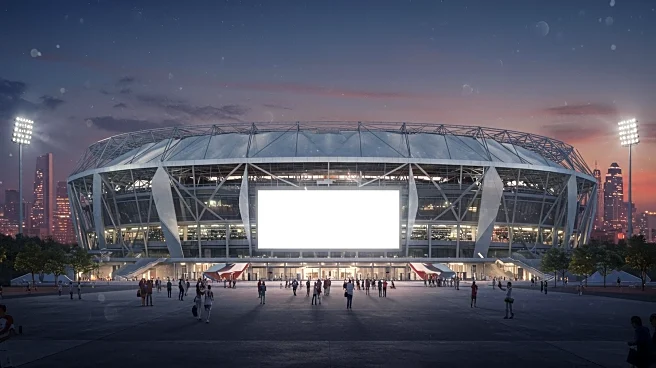What's Happening?
Organizers of the Los Angeles 2028 Olympics have announced a groundbreaking decision to sell naming rights for some competition venues, marking a departure from the traditional Olympic policy of prohibiting brand names on stadiums and arenas. This initiative aims to unlock additional revenue streams and support the largest commercial revenue raise in sports history. LA28 chairperson and president Casey Wasserman emphasized the move as part of a commitment to reimagining possibilities for the Games, ensuring they are fully privately funded with no new constructions. Contracts have already been established with Honda and Comcast, allowing these companies to have naming rights for specific venues. The Peacock Theater in downtown Los Angeles will host boxing and weightlifting events. The International Olympic Committee (IOC) has supported this transformation, allowing up to 19 temporary venues to be named by sponsors.
Why It's Important?
The decision to sell venue naming rights for the LA 2028 Olympics represents a significant shift in Olympic commercial strategy, potentially setting a precedent for future Games. This move could lead to increased financial independence for Olympic organizers, reducing reliance on public funding and minimizing the need for new infrastructure. By allowing corporate sponsorships in venue naming, the LA28 organizers aim to generate substantial revenue, benefiting the broader Olympic movement. This approach may attract more corporate partners, enhancing the financial viability of hosting the Games and possibly influencing how future Olympic events are funded and organized.
What's Next?
As the LA 2028 organizers proceed with selling naming rights, they will continue to engage with IOC sponsorship partners and other corporate entities interested in associating their brands with Olympic venues. The success of this initiative could prompt other Olympic host cities to consider similar strategies, potentially reshaping the financial landscape of the Games. Stakeholders, including sponsors and the IOC, will likely monitor the impact of this decision on the overall Olympic experience and its reception by the public and athletes.
Beyond the Headlines
This development raises questions about the commercialization of the Olympics and its impact on the traditional values of the Games. While the financial benefits are clear, there may be concerns about the influence of corporate interests on the Olympic spirit and the potential for over-commercialization. The balance between maintaining the integrity of the Games and embracing modern commercial practices will be a critical consideration for organizers and stakeholders.









